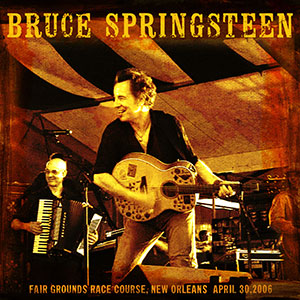Brothers and Sisters Don’t You Cry, There’ll Be Better Times By and By

Bruce Springsteen and the Seeger Sessions Band
New Orleans Jazz & Heritage Festival, New Orleans, LA
April 30, 2006
By Erik Flannigan
Some things are meant to be. That Bruce Springsteen’s immersion into roots music, The Seeger Sessions, was released just six days before he and the band of the same name appeared at the first New Orleans Jazz & Heritage Festival post-Hurricane Katrina had to be an act of benevolent fate. Rarely has the subject matter and style of a particular set of music felt so apropos to a moment.
Often it is the confluence of occasion and performance that distinguishes a great show from an all-timer and on those grounds, Jazz Fest 2006 has come to be considered one for the ages. “This…felt even above and beyond Springsteen’s high performance standards,” wrote LA Times critic Randy Lewis in his contemporary review, “a concert infused with the shout-out jubilation of an unfettered hootenanny.”
Reverent reflections on Bruce’s Jazz Fest performance have continued ever since. “I am not alone in ranking that show as quite likely the best, and certainly most emotional, musical experience of my life,” wrote New Orleans Times-Picyune critic Keith Spera in 2012.
Spera’s opinion is shared by none other than Springsteen himself, who wrote in Born to Run, “There was one show in America that stood out as not only one of the finest but one of the most meaningful of my work life: New Orleans.”
With such heady endorsements, Jazz Fest 2006 fully merits inclusion as the latest release in the archival download series. For those not lucky enough to witness the show in person, the official recording also represents a fresh opportunity to re-experience the performance, previously only available via audience recording.
The sound here, mixed from multi-tracks by Jon Altschiller, is full-bodied and warm, with a wide-stereo mix that gives space to all 20 or so players and singers on stage, and just the right amount of crowd response to capture the full bilateral experience.
“Alright, this is our first gig, let’s hope it goes well,” Bruce says at the top, summing up a spirit that’s equal parts purpose and looseness.
The former comes from being in New Orleans, post Katrina, a subject Bruce addresses head-on, notably in his intro to “How Can a Poor Man Stand Such Times and Live?,” reflecting on the devastation he witnessed while touring the city the day before the show and calling out the failure of government officials, from then President Bush on down, to address the situation. He goes so far as to dedicate the song to “President Bystander.”
The looseness is there by design in the very act of assembling and bringing this seemingly unwieldy number of accomplished players to the stage to play timeless folk and protest music (save for a few reworkings of Bruce’s own songs) for the first time on the road, as Jazz Fest also doubled as opening night of the Seeger Sessions tour.
The result is a Springsteen performance that’s fully in the moment and delightfully off the cuff. One minute he’s solemnly addressing the difficult times many in the Jazz Fest audience were experiencing, the next he’s mocking his own inability to tune a guitar or having an amusing wardrobe malfunction with his belt.
The music follows the same recipe for catharsis. “We Shall Overcome” is majestic and poignant, “Eyes On the Prize” elegiac and “How Can a Poor Man Stand Such Times and Live?” triumphant, each brilliantly arranged to showcase the capabilities of the band. Elsewhere singalong songs like “Buffalo Gals” and “Pay Me My Money Down” offer rollicking fun and feel right at home on the Jazz Fest stage. As Springsteen himself wrote in Born to Run: “I finally had a band that I felt would contextually fit Jazz Fest and might be able to pull the weight of that position.”
Of the Seeger-ized originals played here, “Open All Night,” reimagined as a big-band rave-up, is the standout, but another of Bruce’s own compositions, written with this kind of band already in mind, provided the night’s emotional crescendo.
“This is a song I originally wrote for my adopted hometown, Asbury Park,” Springsteen says introducing “My City of Ruins.” “Parts of it look a lot like parts of New Orleans right now….so I wanna sing this and dedicate it to the people and the city of New Orleans tonight.”
The fitting question the song asks, “How will I begin again?”, and the empowering answer, “Come on, rise up,” struck a deep chord with many in attendance. Wrote Spera in his original Times-Picyune review, “Thousands lifted their hands to the sky. I wept, my wife wept. And we were not alone.”
Throughout the set, lyric after lyric from the Seeger Sessions material feels penned for the New Orleans audience. “What happened to you poor folks just ain’t fair,” Springsteen declares in “How Can a Poor Man Stand Such Times and Live?,” while “O Mary Don’t You Weep” prophesies, “Brothers and sisters don’t you cry, there’ll be good times by and by.” Hearing such words of acknowledgement and hope sung out in such a musically engaging performance translates wonderfully in the Jazz Fest 2006 recording.
Perhaps the LA Times’ Randy Lewis summed it up best: “One concert, of course, cannot even begin to undo such monumental destruction as Katrina left, but Springsteen seemed to understand that even a moment of renewal can make a huge difference.” Amen to that.